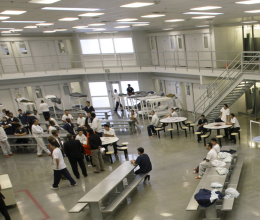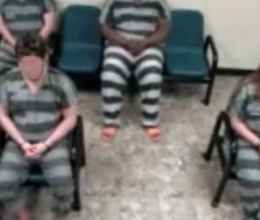
This is a piece about the more than 60,000 people in jails across Texas, the people who work inside the jails as well as courtrooms and police stations, and what we can do to save lives in our community.
You’ve probably already read or heard a lot of information about the COVID-19 virus, its spread, and actions we can all take to “flatten the curve” to reduce the climbing death toll.
What hasn’t been talked about as much are the actions our local leaders can take to reduce the impact the virus could have if there was an outbreak in places like a crowded jail. This kind of outbreak would create a medical and humanitarian crisis for the people being detained, workers, families, and Texas as a whole. You don’t have to take our word for it: Public health experts have stated as much in recent days and weeks as the pandemic escalates.
Jails and prisons are not isolated spaces. They are perfect settings for a life-threatening virus to take hold, brought in from the outside by a nurse, guard, visitor, or attorney, and spread around in close quarters.
People being detained cannot easily access healthcare, hygiene products, or even advocate for their health and well-being. They also don’t have the ability to socially distance themselves from others. Jails and prisons are probably the last places you would want to be during a pandemic.
Yet here in Texas, we have the highest incarceration rate of almost anywhere on the planet. This crisis requires quick, bold action to make sure that prisons and jails in Texas don’t become vectors for the virus.
That’s why the ACLU of Texas, along with several other partners, released a letter to local state leaders urging them to take immediate action to help curb the spread of the virus based on recommendations from dozens of public health experts. The most important thing officials can do right now is reduce the number of people being unnecessarily incarcerated.
For police departments, they can reduce the amount of overall arrests made, particularly for low-level crimes. For prosecutors, they can use their discretion to reduce their requests for pre-trial detention whenever possible while still ensuring community safety. For judges, they can use their power to grant pretrial release in most cases. For sheriffs, they can ensure facilities are as empty as possible, well cleaned, and stocked with adequate supplies of soap and other hygiene products. And for all criminal justice officials, they can adequately train staff to respond to the needs of people who fall ill while in contact with the criminal legal system.
It’s critical to reduce the state jail population now to reduce the risk and spread of an infectious disease that has already killed thousands of people in a very short amount of time. The criminal justice officials who serve our communities have a vital role to play in ensuring that this virus doesn’t spread in jails and prisons. We’re counting on them.







